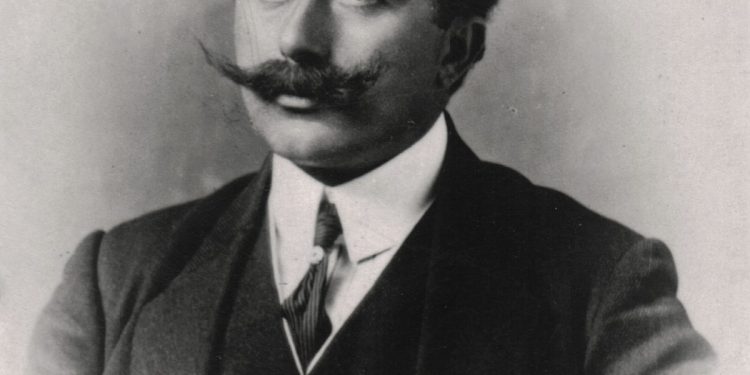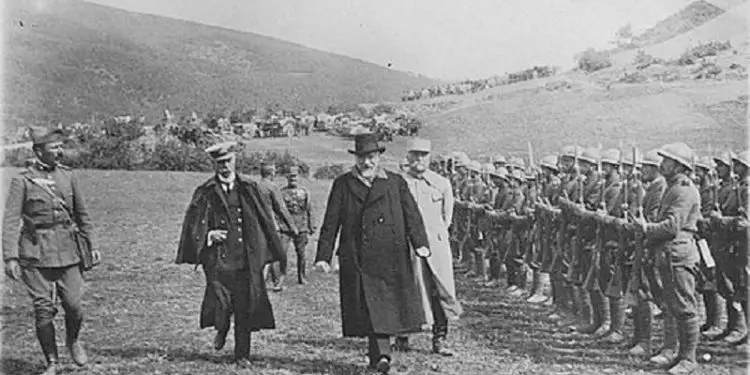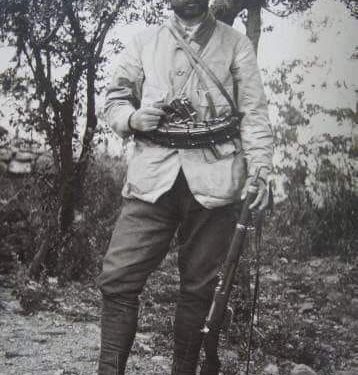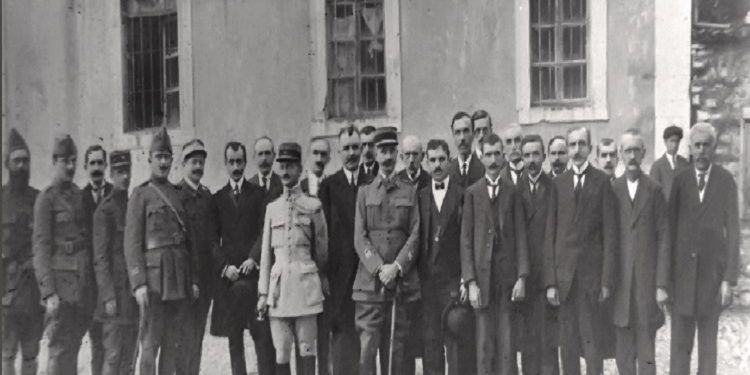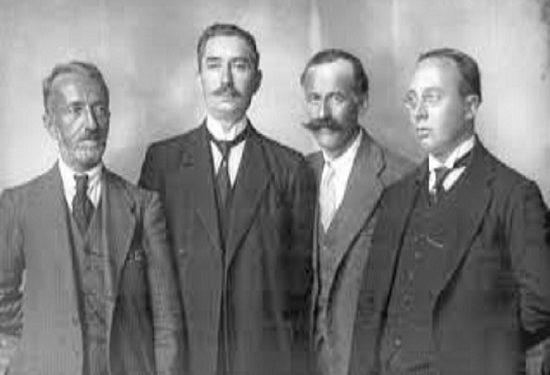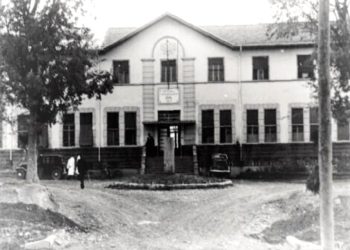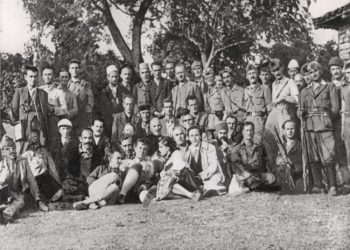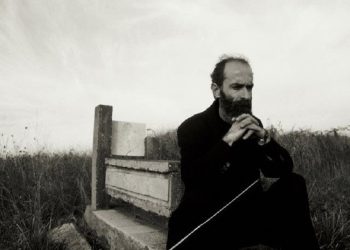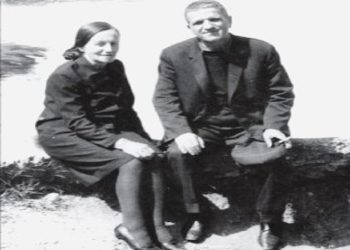By Skifter Këlliçi
(Reflections on the trial against Themistokli Gërmenji and his shooting on November 9, 1917)
Memorie.al/ November of this year coincide with the 105th anniversary of the death sentence of the great patriot, Themistokli Gërmenji, who was “Activist of the national and democratic movement before and after the Independence of Albania…”! He collaborated with the government of Ismail Qemali in Vlora, in 1913 -1914 and performed important tasks in the state administration”, (Albanian Encyclopedic Dictionary, volume 1, page 764, 2008).
The plaintiff in the trial against Themistokli Gërmenji consisted of Benuai, the head of Syrta that is, the Army Security, Drioja, the Security Inspector, and Glavani, also the senior Security Officer. The High Council of War consisted of five French soldiers, as well as defense lawyer Tyber.
It seems strange how an officer like Tyber, one of the intriguers to trap Themistocles, be his defense lawyer!? … This doubt is also expressed by the well-known historian, Muin Çami, in his study “On the sentence of Themistokli Gërmenjit and his execution “, (” Historical Studies “no. 4, 1977, page 118), where he writes, among other things:” If Captain Tyber was really Themistokli’s defense lawyer, then we are completely right to assert that everything was fabricated, perfectly, not only by the prosecution, but also by the trial itself”.
Themistokliu was charged with high treason, based on the indictment, based on Syrta’s recent conclusions, according to which:
- All hostile actions that took place in the province of Korça by the Austrians were done with the help of agents of the prefecture.
- In the Austro-Hungarian area, agents recruited by the French intelligence service were indicted and executed, and their families were interned and imprisoned.
- These (A and B) were caused by both the Austrian intelligence service and its partisans.
The anonymous author of the article published in the newspaper “Posta e Korçës”, on 13.2.1930, entitled “Murder of the martyr”, mentioned above, after listing these important points of the indictment, continues in this article other facts, which are nothing but absurd and ridiculous fabrications of Syrta.
Such is the fact that before the fighting in Boboshtica, Adem Beqiri, an associate of Themistokli, had been sent to enemy areas and had met the Austrian general, Vazari, for information. Not only that, but Themistocles once wrote a letter to the Austrian intelligence chief, which was found on the liner of a hood of an Austrian officer, as Lieutenant De Marie testified.
But all this is refuted by a report by General Sal, addressed to the General Command of the Eastern Army, in which he testifies that the Austro-Hungarian espionage in the direction of Korça, was led in Sovjan by senior officers, Semere and then Vitner, mediated by an agent, named Muharrem, recruited by them. (P.Tako, “Themistokli…”, page 309). So, General Sal himself, who as we have seen, had replaced Dakoen months ago, respected by the Albanians, in this report does not mention Themistokli anywhere.
In his article published in “Posta…”, the anonymous notes that in the trial were read some testimonies of prisoners. They were taken after constant torture, as Çiz Mehmeti, a gendarme of Themistokli’s forces, would declare years later. Moreover, as anonymity asserts, these witnesses were not called to testify during the trial.
One of these witnesses was the Albanian Pasho Kolaneci, who was sentenced to death, but was later pardoned by Syrteja. It was he who gave Benua information that he had allegedly been Themistocles’ liaison with Fehmi Zboqi, another Albanian accused of treason against France. Thus Pashoja was pardoned and together with him Fehmi Zboqi, who was later released.
According to anonymity, Themistocles with unparalleled composure refuted this evidence, which had no basis. In conclusion, the trial panel could not prove the charge against Themistocles for high treason.
In the continuation of his article in “Posta…” Anonymous writes that the defense lawyer, Tyber, pointed out that the War Council could not judge Themistokliu as a Frenchman, but as an Albanian.
“He defended the thesis that man cannot be called a traitor, except when he works against his nation and homeland, whether alone, or in cooperation and in agreements with foreign powers. Themistokliu, as an Albanian patriot and senior official of his homeland, is responsible for his deeds, only before his own nation. “So he demanded innocence.
Perhaps the anonymity in question 13 years after this event confuses Tyberus, an enemy of Themistocles, with someone else who may have expressed these words, who has been shown not only to be honest during this rigged trial, but also objective, as claims the scholar Tako, in his work dedicated to Themistocles.
Tako further writes that later a prominent professor of the University of Paris has expressed almost the same opinion about the unjust sentence of Themistocles. The professor underlines that during this process many accusations were made which, in his opinion, were fabricated. It is possible that Tyberi himself, after many years, has expressed feelings of remorse for the unjust punishment that sent Gërmenji to the bullet.
In his book “Six months of the history of Albania”, (French), published in Paris in 1929, Dakoeni, the former commander of the French forces in Korça, who was later replaced by Sali, “has given the opinion that French justice he had to review the process, because in the trial of the case “there were legal errors”. This opinion was also expressed by Albania’s friend, Zhysten Godar, in the preface of this book. “Other French people who had sympathy for Albania have also been of this opinion.” (P.Tako. ”Themistokli…”, page 311).
The court, after this disgusting farce, sentenced Themistokli to death with three votes in favor and two against. Syrteja thus finally defeated Sarraj and the chiefs, who had defended Themistocles.
Let us dwell on the article “The truth of the execution of Themistokli Gërmenji by the French” written by the researcher and writer, Aurel Plasari, published on February 16, 2016, in the newspaper “Tema”, which provides some new data from the above court process .
“The main witness was a Demir Hasan,” Plasari said. With his statements during the process he testified about the secret contacts that Th. Gërmenji with the “other side” of the front, that of the military forces of the occupation in Albania. For the Eastern Army command, such contacts were considered “betrayal”, in the sense of “cooperation with the enemy”. So, it turns out that in this trial there was an Albanian witness, but based on the cynical intentions of Syrta, to accuse Themistokli of “cooperation with the enemy”.
“From the Albanian point of view, such contacts of Gërmenji, – continues Plasari, – constituted a far-sighted political position in favor of maintaining the stability of the Autonomous Republic of Korça, as well as its future, when the First World War was over. Later, the French general Dakoen, the declared benefactor of Korça and of the Albanians in general, – continues Plasari, – openly expressed this view: “Themistokli had a connection with the enemy, which does not mean with the enemy. ”We have used those links together in many cases.” (Gen. Descoins, Six mois d’histoire de Albanie, novembre 1916- mai 1917, A. Costes. 1930, f 51) ”.
After hearing the jury’s decision, Themistokliu said calmly: “No matter how I was sentenced to death, I am dying innocent and I am convinced that my death will serve Albania. He added: “I am sorry that I am dying from the bullets of the French, with whom I pledged to serve the Albanian cause and friendship with France. This pain will be sweet knowing that I die in the fight for the freedom of my beloved homeland, Albania…. I die happy and satisfied, that I have a clear conscience and a calm spirit in fulfilling my duties towards Albania. The last prayer I address to the French is not to drop the national flag, which I raised in Korça and not to become a cause for the destruction of that part of Albania. ”
According to Anonymous “word these words shocked those who happened to be in the hall, how many of them lowered their heads in shame, that they could not see him straight in the eye”. (“Posta…”, 25.2.1930).
Logically this must have happened because, in the French military setting, there were people who realized how low they had fallen, who mounted such a shameful process, to slaughter Themistocles and deliver the deadly blow to the Autonomous Province of Korça.
And this, because the French invaders already realized, also, that the creation of this province was a great victory, not only of Korça, but also of Albania, which affected their interests in the future. Even after the end of the World War, they thought of preserving areas of influence in the Balkans and in Albania. It was not in vain that they kept Esat Pasha in Paris, to then return him to Albania, to play French and Serbian cards.
Firing
At that time, on November 9, 1917, Themistocles was only 46 years old. That the French Security had stuck him in his bloody clutches, he had foreseen. However, he did not leave Korça, which he could easily do, because he would not hold anyone accountable, especially the French occupiers. There are even allegations that his friends had told him to leave, and yet he did not leave, convinced of his justice. (“Gazeta e Korçës”, 11.2 1930).
At the time of Themistocles’ shooting was Ogyst Mortieri, a French soldier who in 1914 had married a Pogradec girl named Athena Sotiri. And in 1917, after the fighting in Pogradec, where Themistokli also participated, he was appointed garrison commander. “The team,” he testified, “was about to shoot.” Themistokliu opened his chest and with his body forward he cut the battery of bullets manfully, like a real Albanian.“ (“National Assembly”, Ilo Mitkë Qafëzezi, “The assassination of Themistokli Gërmenji”, December 17, 1933).
“When they were going to shoot him,” said a French senior staff officer, “he refused to close his eyes and asked for a piece of paper from the firing squad officer, asking that it be read after the shooting was over.” duty. And while the rifles were being emptied, it was heard from his mouth: “Long lives Albania! Long live France. Themistocles fell slowly, as a large oak is expected. Officer Çeli filled the letter and his eyes filled with tears when he read: “And after my death”, “Long live France”.
Further in this article, I. M. Qafzezi writes: “The shooting was followed by two shadows. They wanted to convince him with their own eyes of his death. And they disappeared again like ghosts, as soon as they saw that the brave watered with his innocent blood, the foreign land. Who could these be? Maybe Esat Pasha and Eftim Gjini”.
Gërmenji was not buried in Korça, where he had expressed his wish, but in Zeitenlik, Thessaloniki. Not even in the civil cemetery, but in those of the Austrian captives. And this happened because the French invaders feared that Themistocles’s funeral in Korça would turn into furious popular manifestations against them. (Muin Çami, “Studime…”, no.4 1977, page 120). The remains of Themistokli were buried after many years in the cemetery of Korça.
A day after the shooting of Themistokli, on November 10, General Sal, the commander of the occupying forces in Korça, convened the governing council of the Autonomous Province and cynically announced that the night before; Themistokli Gërmenji had been shot as an accomplice of France’s enemies and allies hers.
This news shocked the audience immensely, because no one believed the words of the French general. But, strangely, French major, named Masje, said to Sali without fear: “If Themistocles was guilty, I am the biggest culprit.” So he testified that Themistolki had not betrayed. Only a few days passed and Masje was no longer seen in Korça. (“Drita”, “Themistokli Gërmenji one of the efforts for the self-government of Albania”, 23.11.1973).
Upon receiving this mandate, Themistocles’s wife, Evdhoksia, met with Glavan, the French security chief in Korça, and asked him to explain the reasons for her husband’s shooting.
“Whatever they are, I protest his murder, because Themistocles was innocent and fell victim to slander,” she added.
“Look, madam,” replied Glavani, using all possible arguments. “You must accept the fact, however bitter, that the War Council, which convicted your husband, relied on solid evidence.”
-What evidence? “Give it to me,” she said angrily. – What trial was he, when no witnesses were called, to blame my husband?
The widow looked at him rebuked and angrily added:
-Themistocles never acted with his head and without talking to Dakoen and then to Sal. What was he accused of? Please, once again, present me the evidence.
Glavan was embarrassed.
“The court upheld the decision,” he said, “in the evidence presented, which proved that Themistocles had given the enemy military information about Korca and its province.”
“It is not possible,” she replied. – Please let me go to Thessaloniki to gather the necessary information. I want my husband’s trial to be repeated, believing in his innocence. (P.Tako, “Themistokli…”, page 323).
But this evidence Glavani and other senior French officers never gave to Evdhoksia. Of course, they had nothing to give him.
However, in June 1920, Evdoxia met with another French general, De Bartu, and asked him to provide a copy of the court order. And De Bartui promised. But when he went to Thessaloniki, he saw that all the court orders of the Eastern Army had been sent to Paris. However, he asked the Ministry of Justice in Paris to send him a copy of the Thessaloniki trial against Themistocles. But this process did not fall into his hands and consequently, into the hands of Eudoxia. (State Archive, file 27, page 5, letter from Furtusa, Sofia, 7.7.1920).
After the shooting of Themistokli, the police commissars, Kozma Trebicka and Llazo Progri, Tefik Panariti, Mehmet Starova and later Qamil Panariti, etc. were targeted in Syrta. Some of them died in the Bitincka concentration camp, and even in French Guiana.
The French invaders unhesitatingly abrogated the Protocol of December 10, according to which Korça, as we have seen in the first parts of this cycle, was declared an autonomous province and it was simply called the kaza of Korça, occupied by the forces of the French army.
“We, the soldiers of France,” Sali said hypocritically, in a meeting with members of the “Progress” society, “are fighting to spread the words of freedom, equality and brotherhood throughout the world.” “All those who understand, $ ‘want to say these words, are our friends, those who do not want to understand them, are our enemies.” (“Gazeta e Korçës”, July 24, 1917).
The news of Themistokli’s shooting caused grief, pain and indignation among all Albanians, inside and outside the homeland. Among them felt this loss, his friend of arms, Sali Butka. The news of his death was published by many newspapers, including the newspaper “Dielli”, which was published in Boston, which wrote: “The Franks double-check the prefect of Korça, the great patriot, Themistokli Gërmenji” (December 18, 1917). That was understandable. By killing Themistocles so cruelly, France had also killed the hearts of the Albanians, who saw in him a great patriot of the national cause.
EPILOGUE
One morning in January 1999, a few months before I left for America, on a walk with the well-known publicist Pirro Naçe, a man with a smiling face, he stopped in front of us. After greeting us, he began to speak French.
– Meet the French ambassador in Tirana, – Pirroja then addressed me, adding his name.
Then I also told him who I was. How did he think a bit, he with a perfect Albanian, asked me if I was the author of the novel “Killer with white hands”, dedicated to Themistokli Gërmenji. I affirmed with pleasure. Then his face was covered for a moment by a shadow of sadness.
-A few days ago, – he started talking, – I paid a visit to the cemetery of French soldiers, who fell in Korça during the First World War. And there I laid a wreath at the grave of the great Albanian patriot, Themistokli Gërmenji, who was unjustly shot by our military in 1917.
After so many decades, France, through its ambassador, apologized. In short, but significant.
However, such noble actions that have been repeated by other French diplomats who have worked in Tirana are not enough. Based on the facts that will be revealed from the opening of the file of this trial, plotted judicially, the innocence of Themistokli Gërmenji will be confirmed, already legally. And it is hoped that this file, finally, will be in the hands of our researchers as soon as possible, ie 105 years from the day of the death sentence of this outstanding activity of our national movement./Memorie.al




